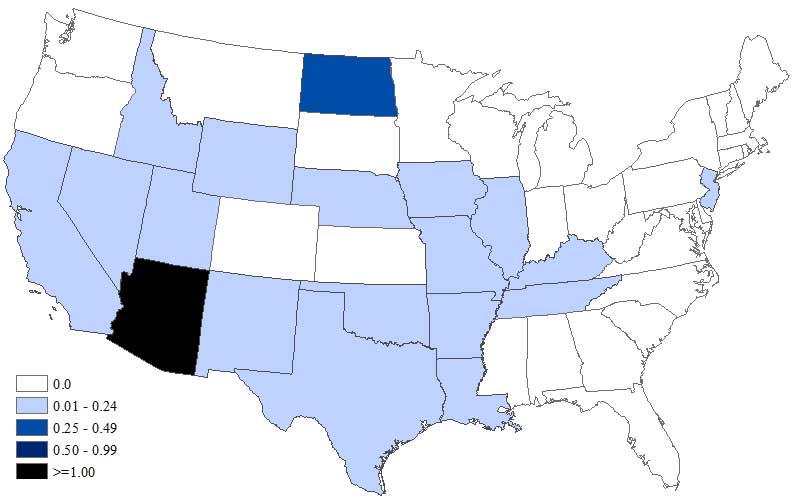Top News
West Nile toll in county continues rising
By: Deborah Rowe, Courier staff
08/18/2005
Email to a friend Voice your opinion Printer-friendly
The toll keeps rising. Two more people in Montgomery County were stricken by the deadly neuroinvasive West Nile virus reported in July, bringing the number of infected to three for the county. The first case was reported in June.
Advertisement
West Nile virus can have mild, flu-like symptoms, but can also be neuroinvasive, causing swelling of the brain, spinal cord or surrounding membranes, resulting in death. People and animals contract the virus from the bite of an infected mosquito, not from other people, animals or birds.
According to Doug McBride, press officer for the Department of State Health Services, all three victims are male adults.
According to Pat Buzbee, Montgomery County Environmental Health director, the two latest victims reside in the Conroe area.
"They have already been treated and released from the hospital," he said. "Their symptoms were not severe."
McBride said that the names of the victims could not be released to the public because of medical confidentiality laws.
Montgomery County has had its share of West Nile virus cases in the past. In 2004, one person contracted the disease; in 2003, 17; and 2002 there were seven, McBride said.
The disease took the life of Conroe resident Ray Jepsen, in 2003.
Other new cases since June were reported for Angelina County, 1, Swisher County, 1, Tarrant County, 1, Harris County, 2, Hardin County, 1, and Jefferson County, 1.
The department also released other West Nile virus cases for Texas this year: birds, 85; mosquitoes, 204; horses, 3; other, 6; bringing the total to 298 cases, including the 10 people.
The department also released summaries of West Nile virus victims in Texas in previous years. In 2004, there were a total of 119 cases reported in 40 counties. In 2003, there were 439 cases reported in 86 counties. In 2002, Texas had 202 cases of West Nile virus reported in 37 counties.
North Montgomery County is taking an active role in the prevention of the spread of the virus.
According to Precinct 1 Commissioner Mike Meador, they spray for mosquitoes in the area every night.
"We spend approximately $12,000 a month for the spray," he said. "We have been spraying since June."
Dr. James Kennedy, professor of biology at the University of North Texas, said that people need to be vigilant in protecting themselves from the virus and aware that mosquitoes are adaptable and are here to stay.
"When scientists test mosquitoes for viruses they often combine a number of individuals representing species likely to be carrying an arbovirus - a virus carried by organisms like insects, ticks and spiders," he said.
According to Kennedy, control and prevention is the key to addressing the problem.
"But control methods such as spraying at night with pesticides must be scrutinized for safety and should not be applied routinely," he said. "Even though chemically-based pesticides are effective and become less hazardous over the years, I recommend environmentally friendly control methods as a first line of defense, rather than pesticides."
Kennedy said that environmentally friendly control methods are less likely to cause human health problems.
"For example, public education, eliminating mosquito breeding grounds in residential areas and use of environmentally friendly control methods as a first line of defense, rather than pesticides," he said.
These techniques are less likely to cause human health problems, Kennedy explained.
"For example, public education, eliminating mosquito breeding grounds in residential areas and use of environmentally friendly biocides like Bacillus thuringiensis can be applied to habitats where mosquito larvae live," he said.
According to the Department of State Health Services, there are four things to do to prevent exposure to the West Nile virus.
1.Don't go outside unless you have to between dusk and dawn.
2. When you do go outside, wear long sleeves and long pants.
3. Wear DEET, an insect repellent, on any exposed parts of the body.
4. Drain any standing water in your yard or on your property that may breed mosquitoes.
The department also lists some of the most common places to look for mosquito habitation: clogged-up roof gutters, birdbaths, plant trays and natural holes in trees in the yard. Drain standing water around home to reduce mosquito-hatching grounds.
For more information about West Nile virus, visit www.tdh.state.txs.us or call 1-888-883-9997.
©Houston Community Newspapers Online 2005
News Clips and Information on West Nile Virus Survivors. Videos and links to News Articles on West Nile Virus Families, West Nile Deaths, West Nile Virus Prevention and West Nile Virus Symptoms
Thursday, August 18, 2005
Subscribe to:
Post Comments (Atom)
CDC West Nile Virus Info
Skip directly to page options Skip directly to A-Z link West Nile Virus Neuroinvasive Disease Incidence by State 2019 West Nil...

-
Teenage girl in Menifee dies after four-year battle with West Nile illness Download story podcast 10:00 PM PST on Wednesday, December 10...
-
Skip directly to page options Skip directly to A-Z link West Nile Virus Neuroinvasive Disease Incidence by State 2019 West Nil...
-
Tosa man battling West Nile dies Steiner was principal of Wauwatosa West High School By KAWANZA NEWSON knewson@journalsentinel.com Posted: N...

No comments:
Post a Comment